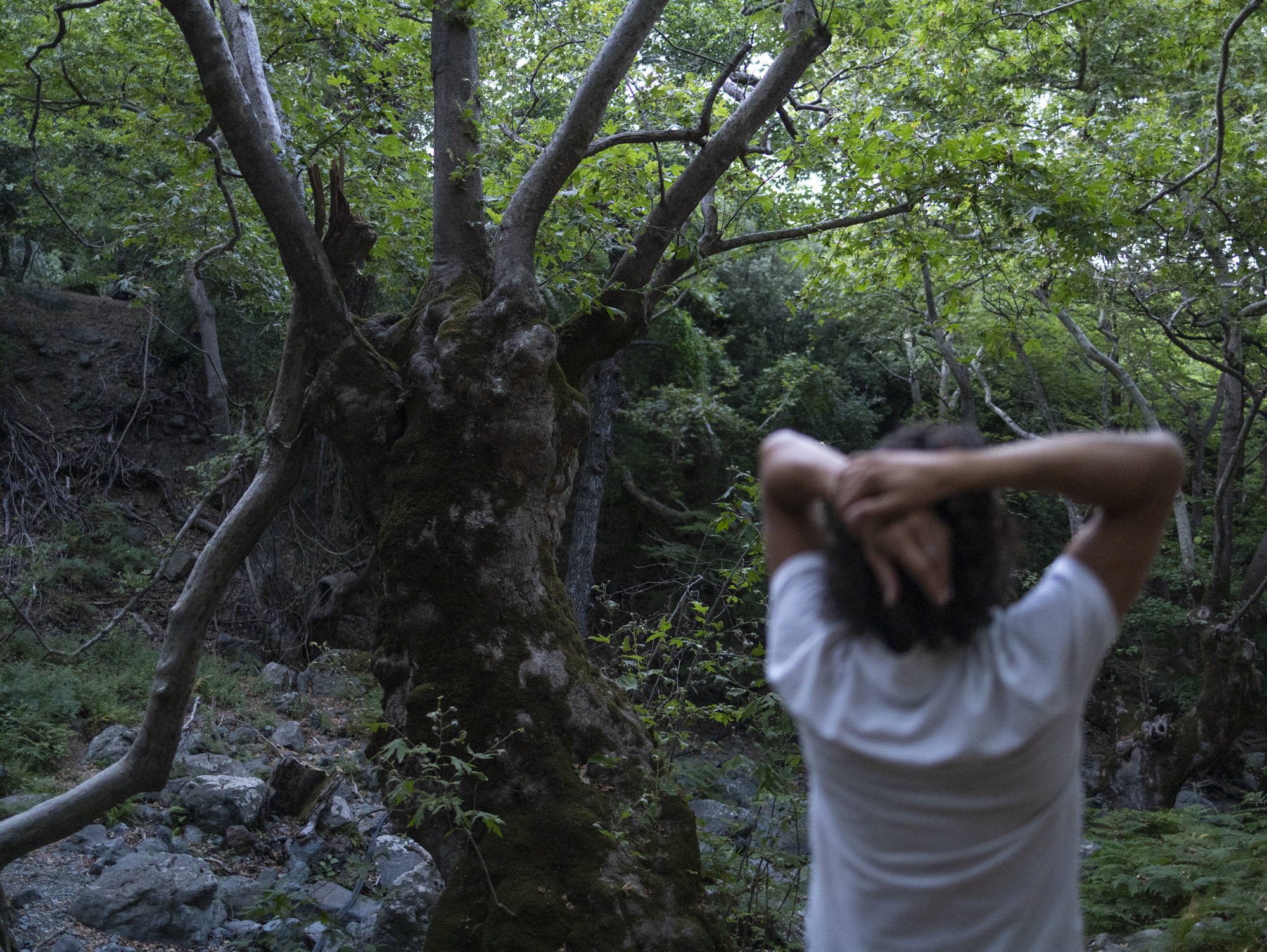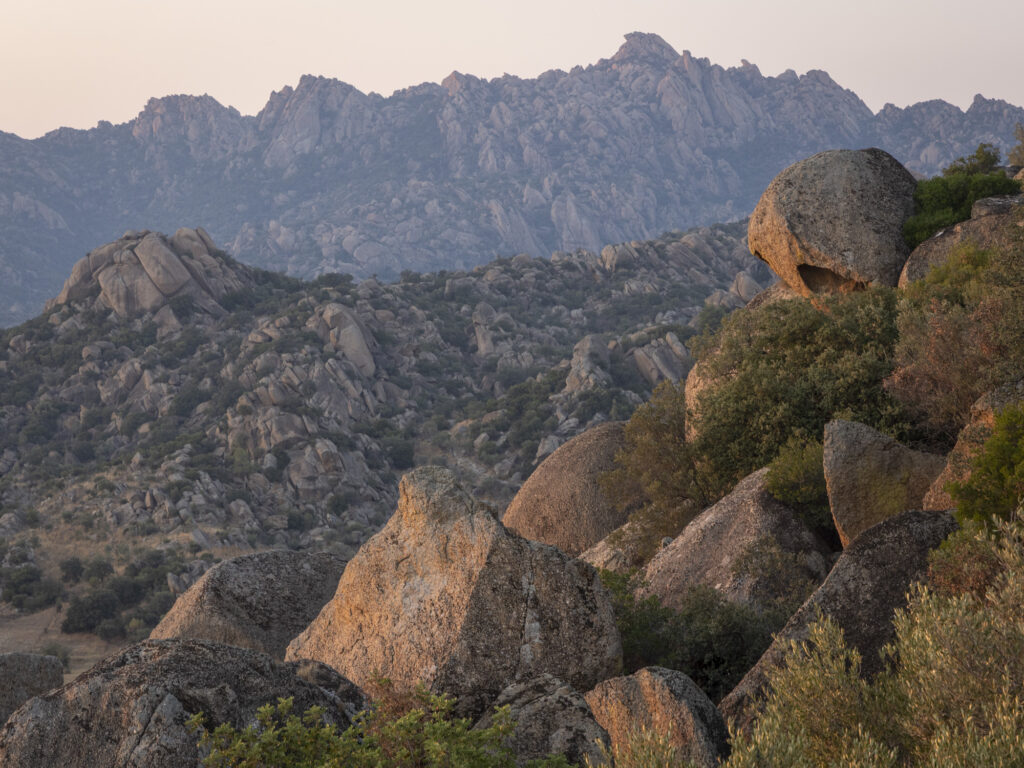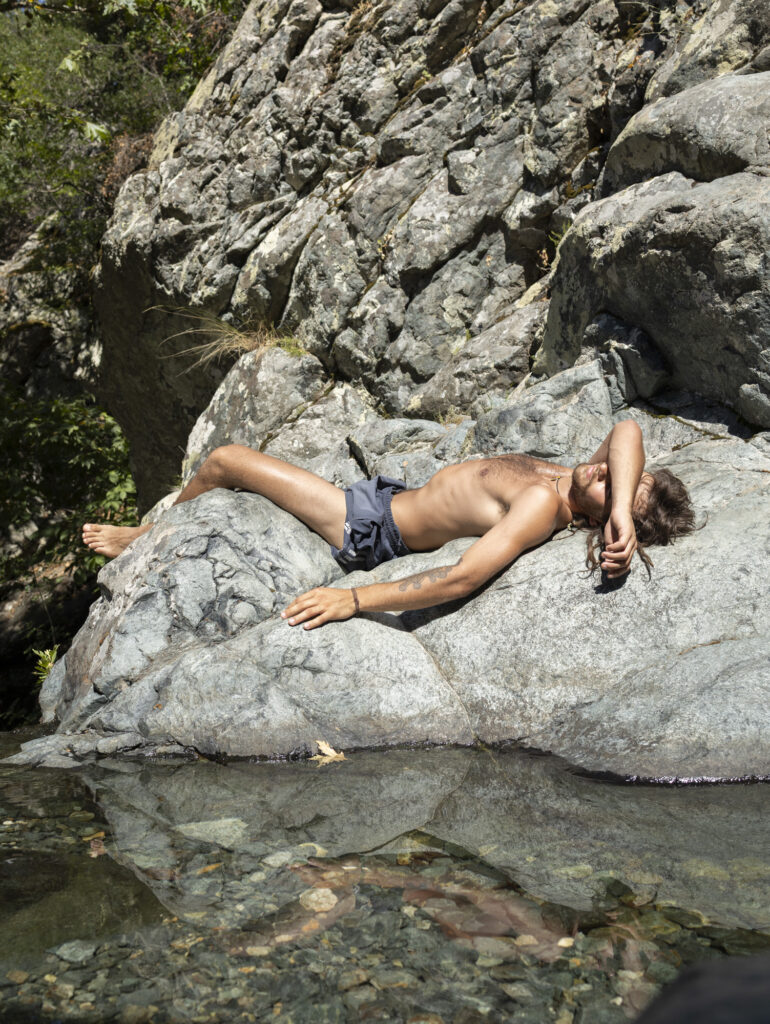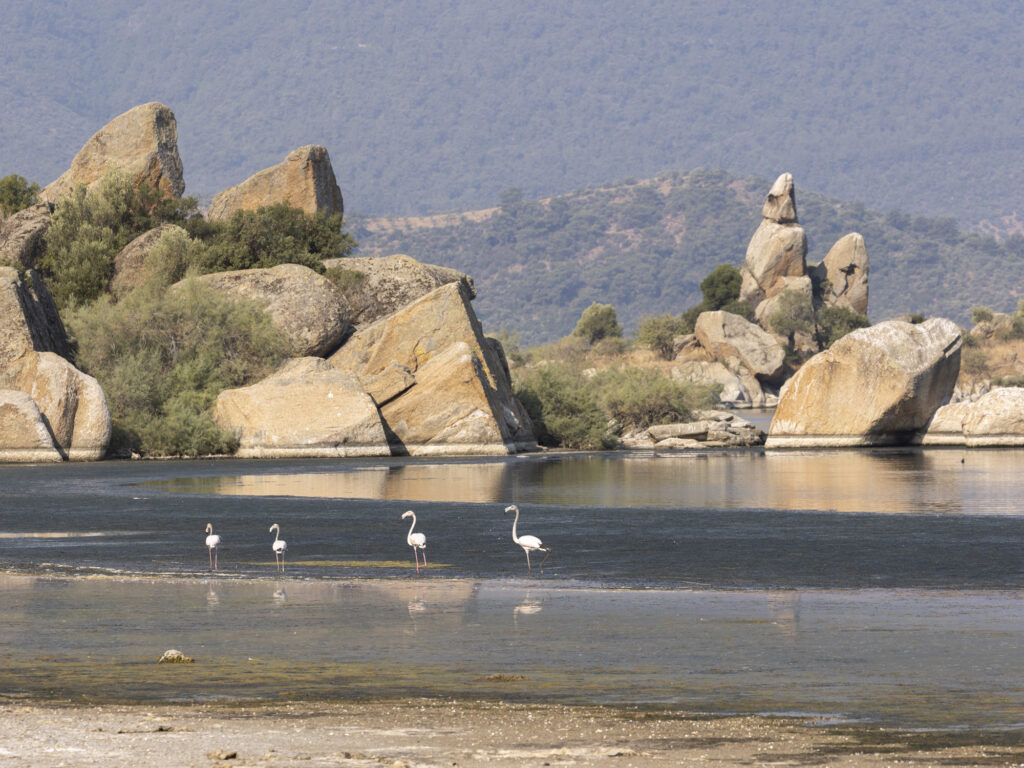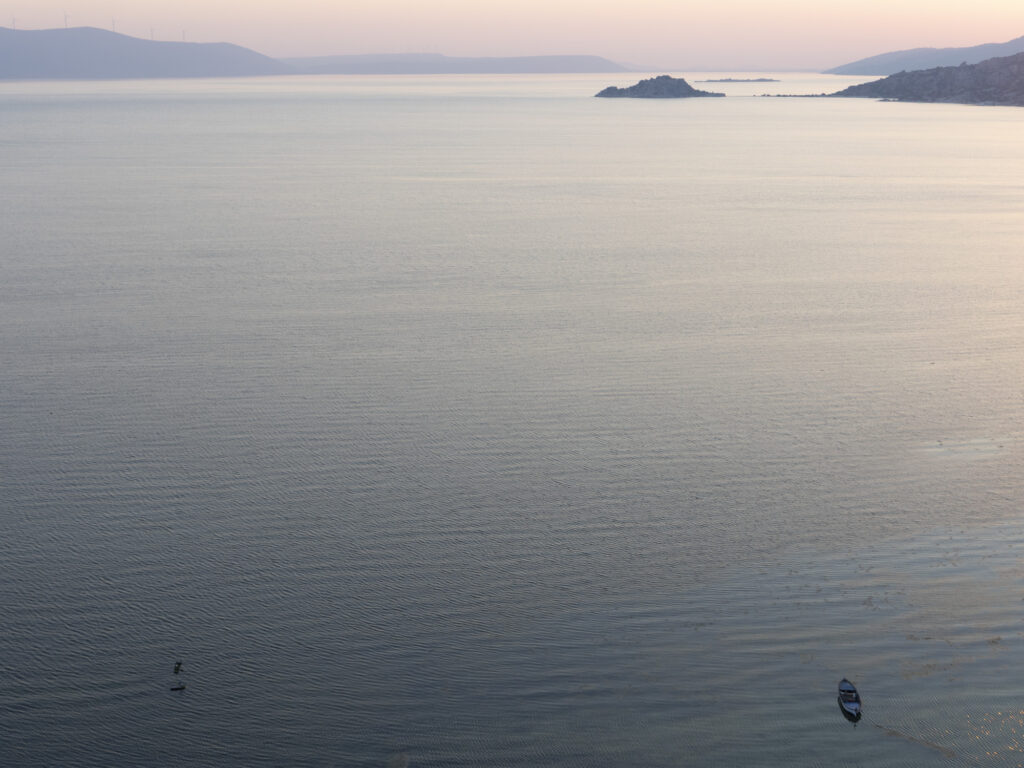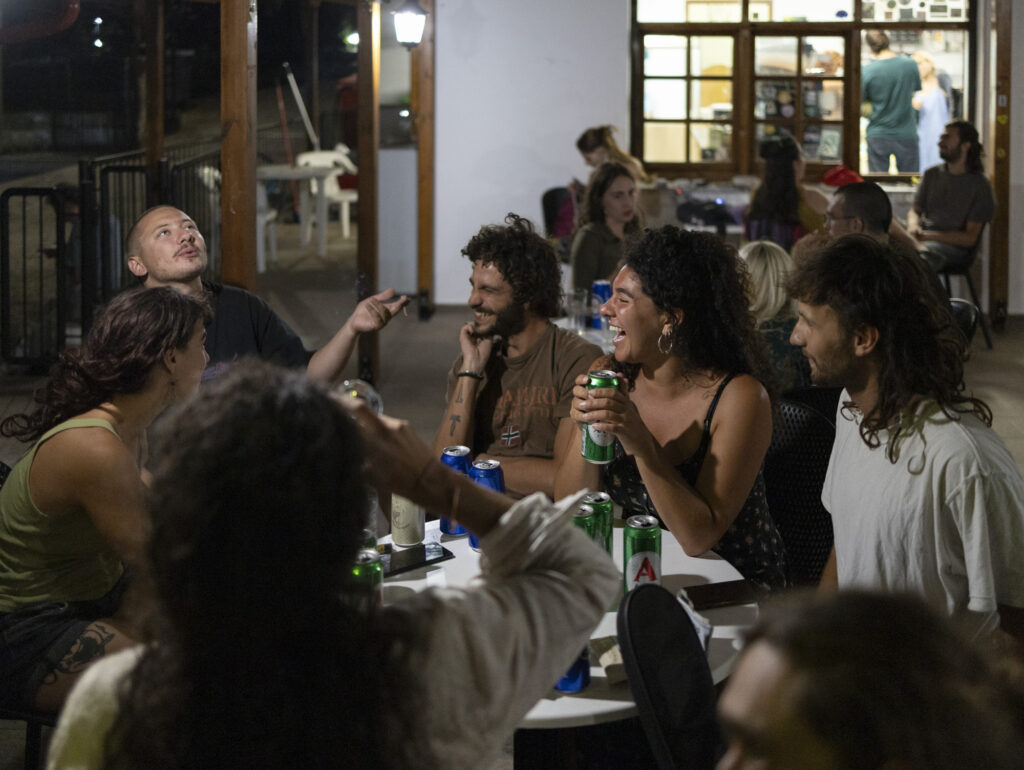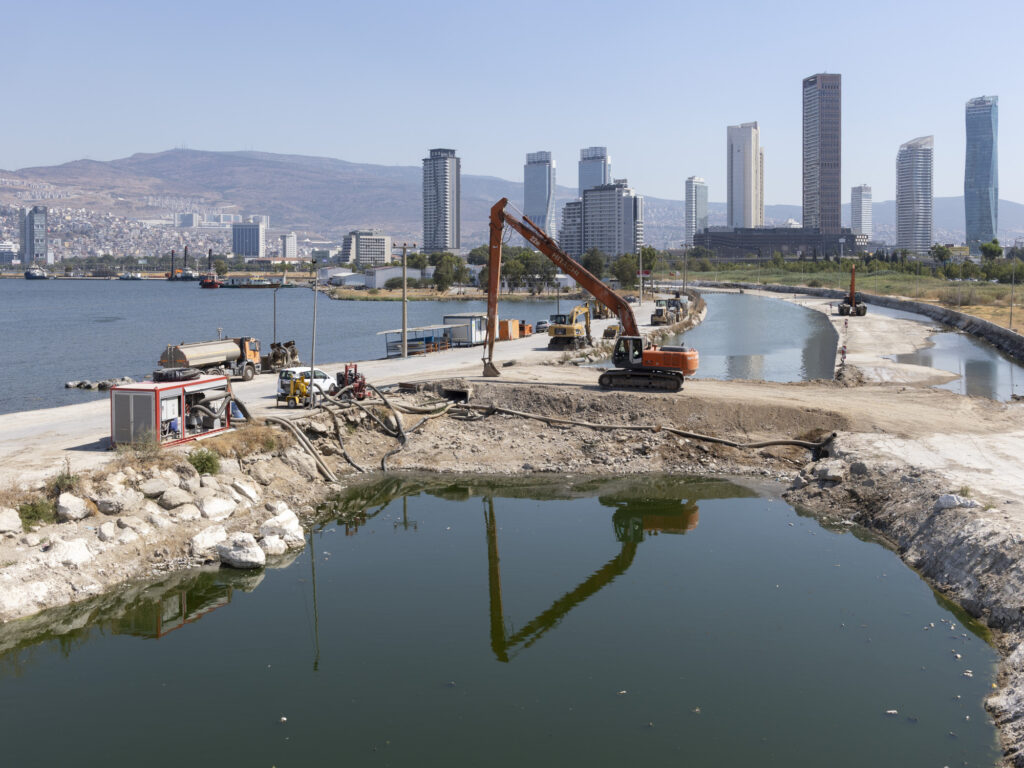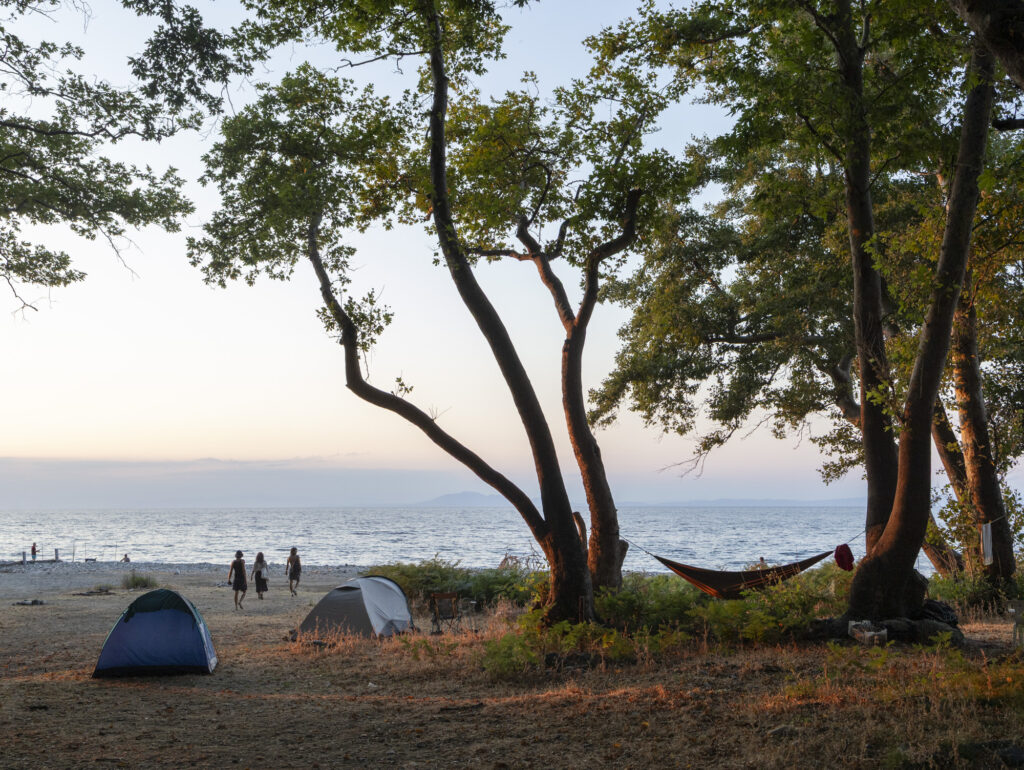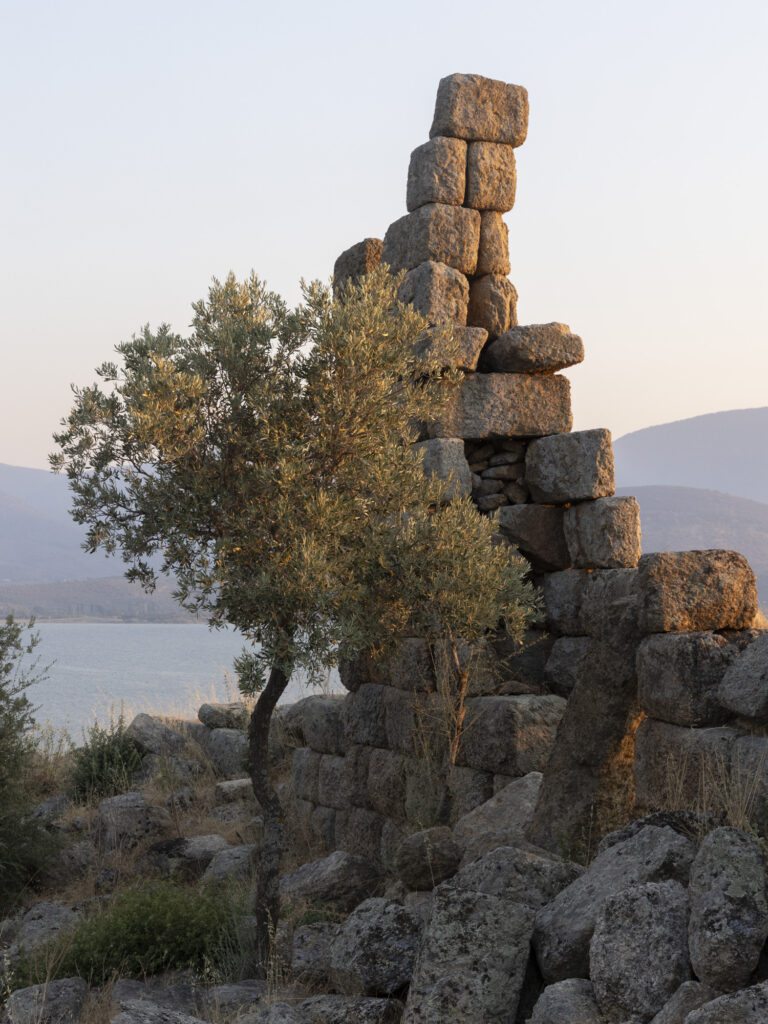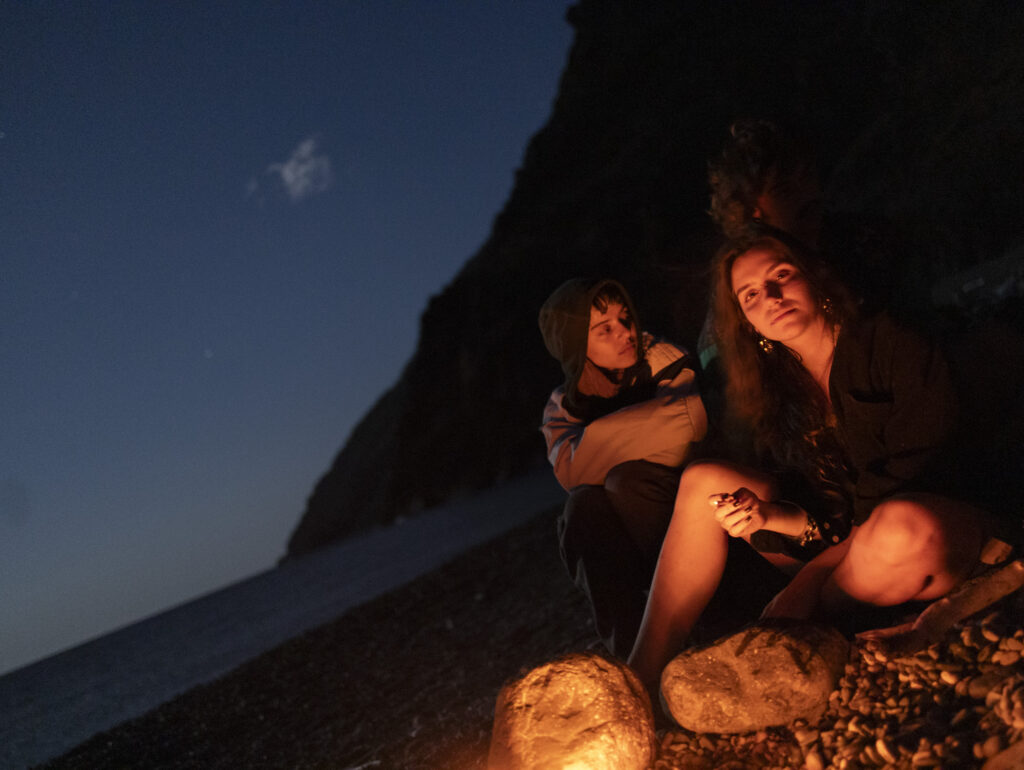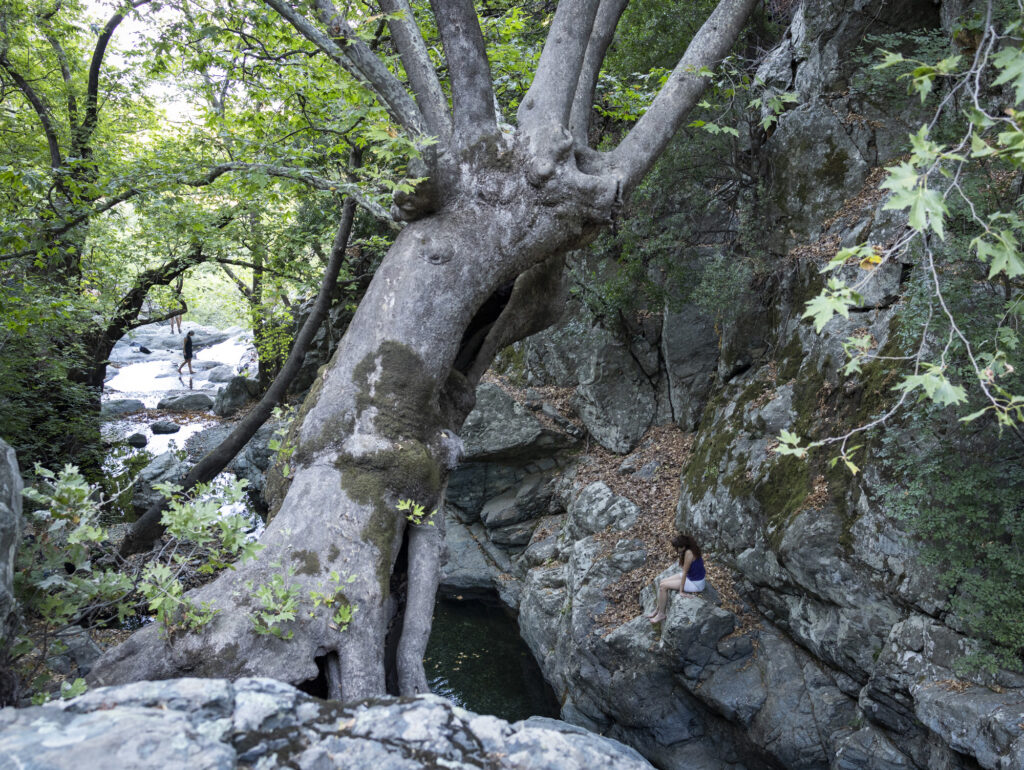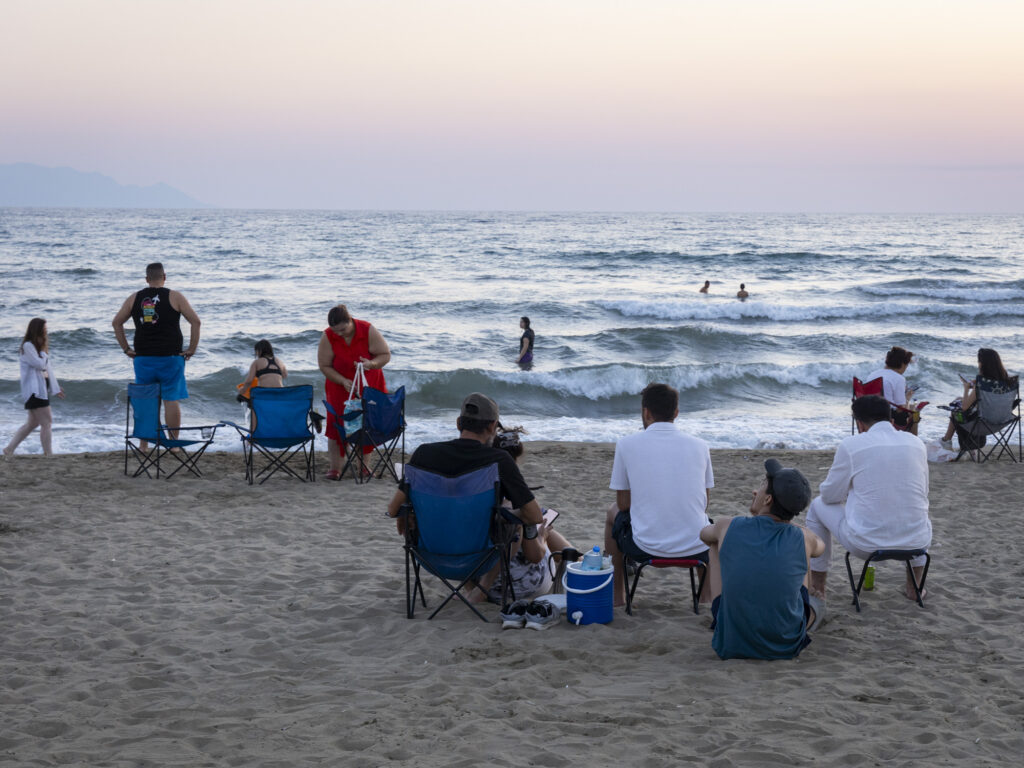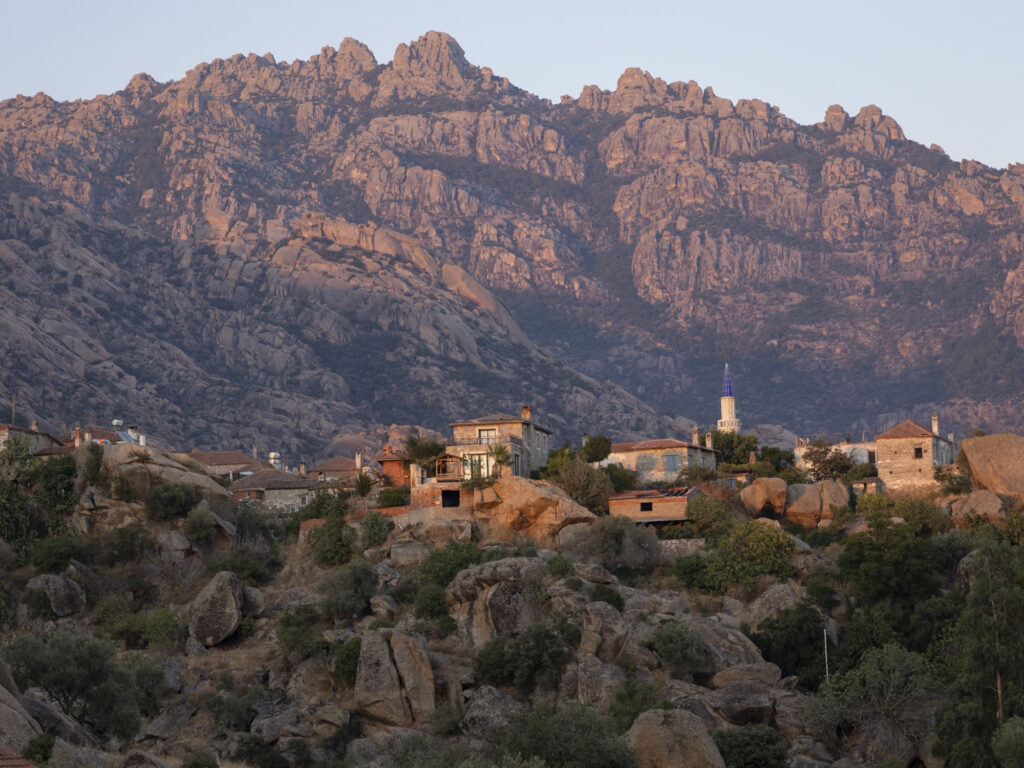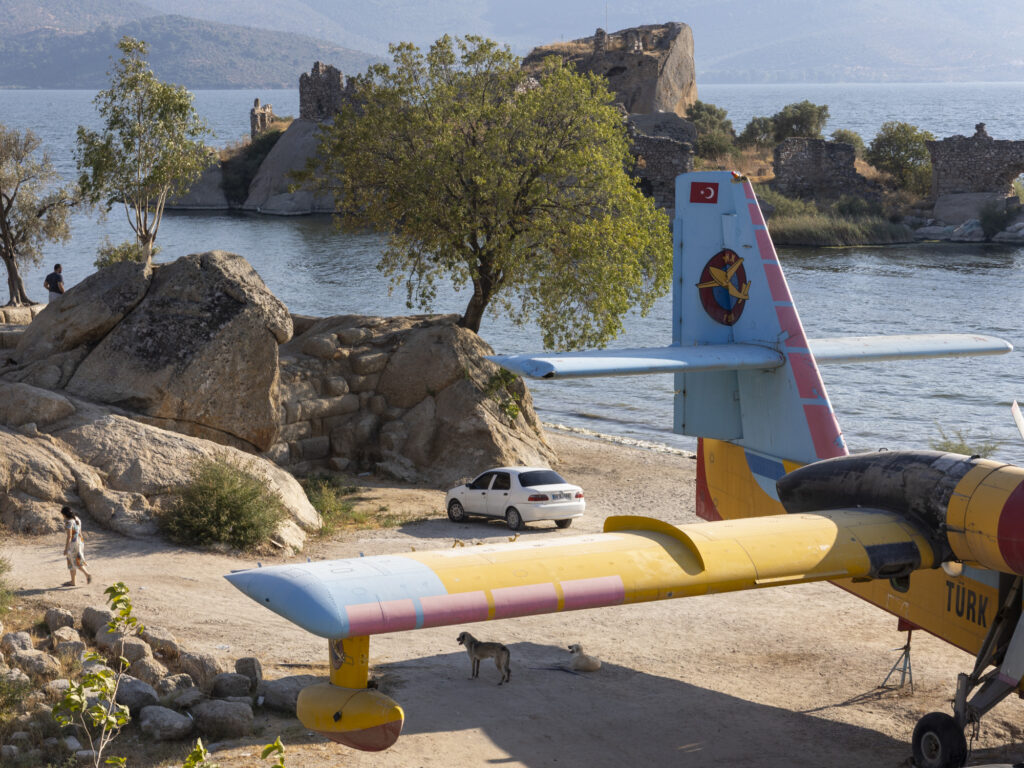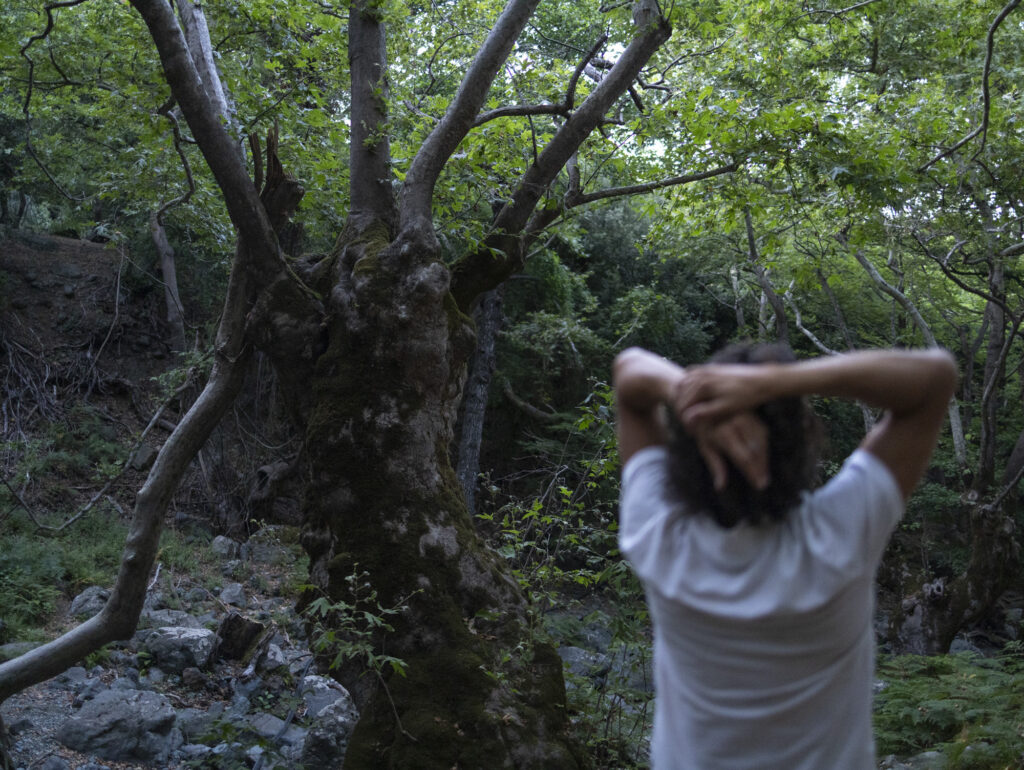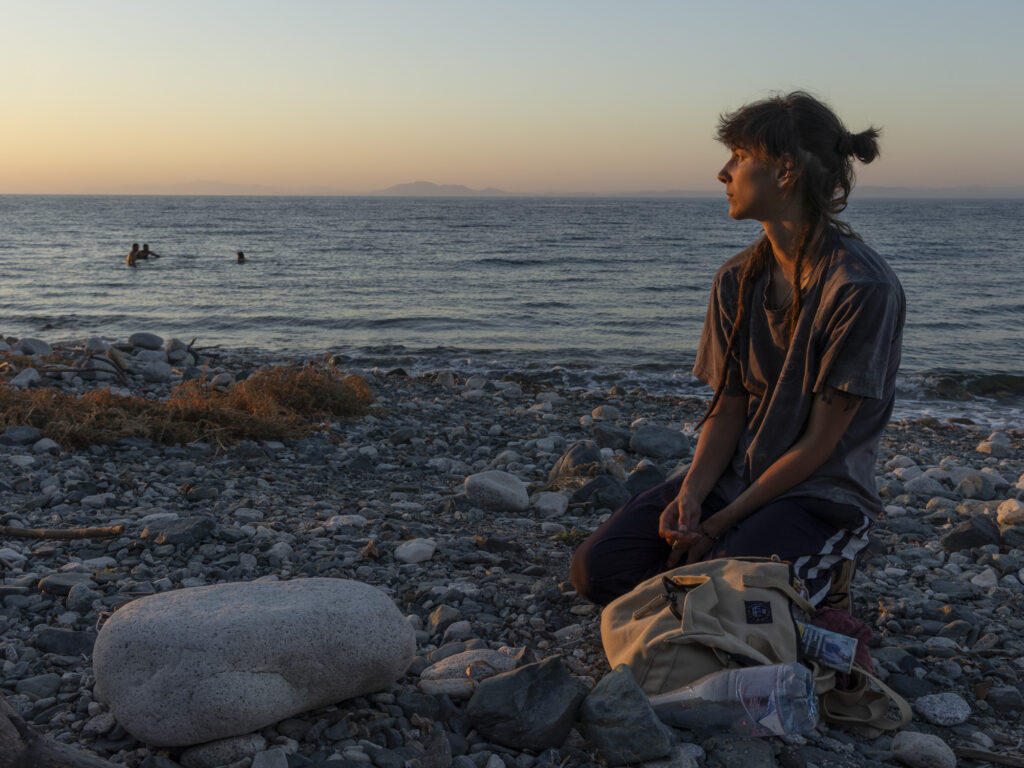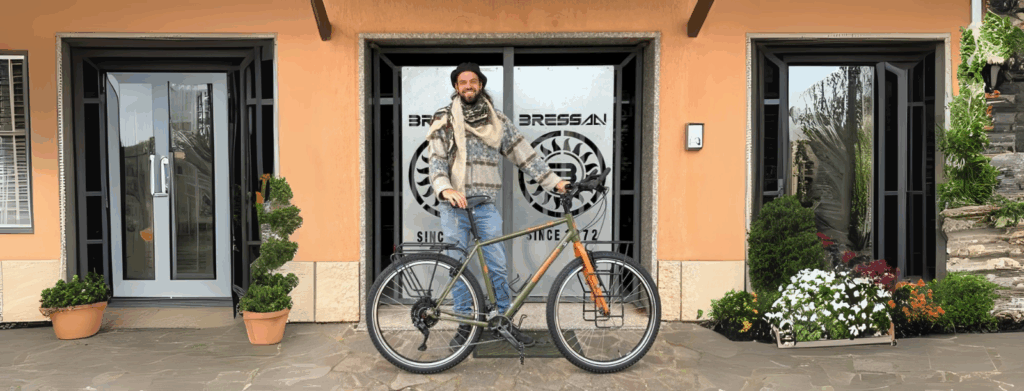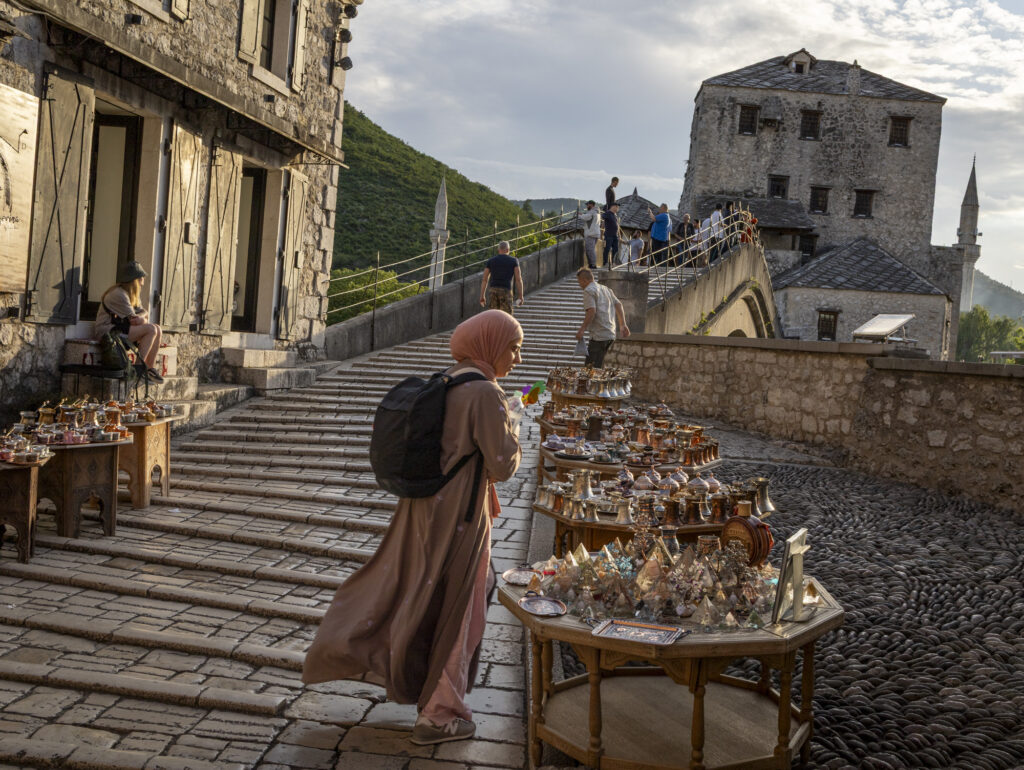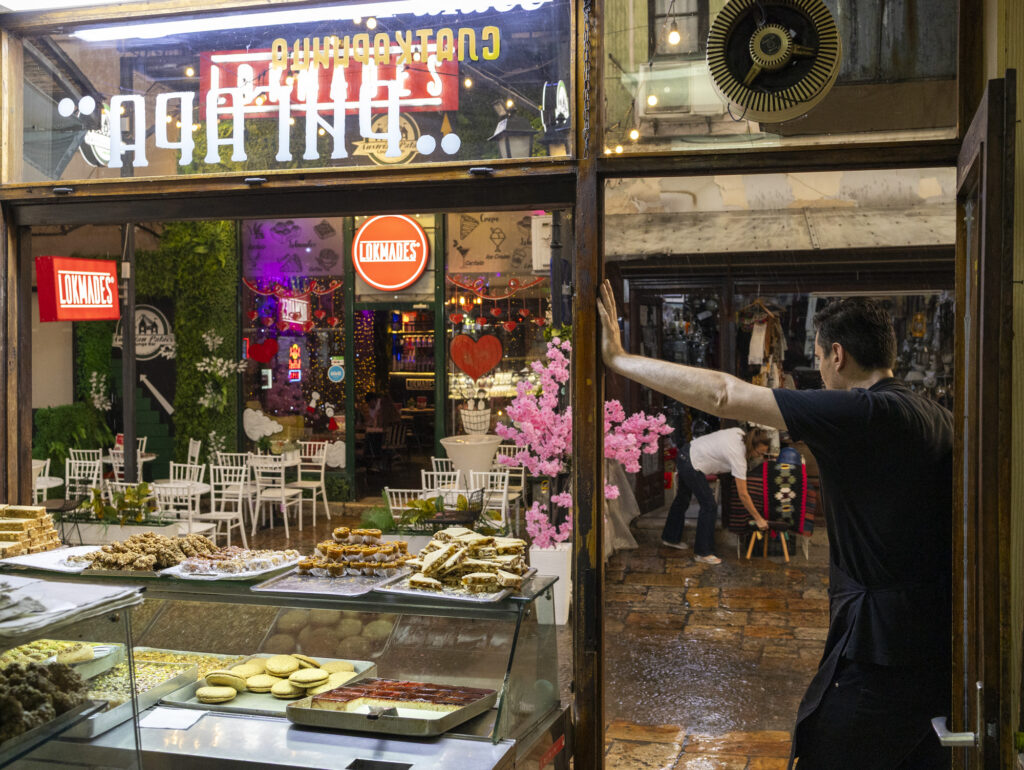(Photos and captions at the end of the text)
“The midwife knows that without pain, the path cannot be paved for the child, and the mother cannot give birth. Likewise, for a new self to be born, difficulties are necessary. Just as clay needs to endure intense heat to become strong, Love can only be perfected in pain.”
A swarm, a cloud that continually takes shape and dissolves. Like vapor particles, they are everywhere, densely present but almost invisible. Meanwhile, torture. Hundreds of mosquitoes make the first sunset in Greece, fifteen years after the last time, hellish. Shortly before, as soon as I arrived in Petrota, I had been attacked by red and black ladybugs. Definitely sweeter. They disappeared with the sun, leaving the memory of my good fortune in the air and replacing it with the much more lucid one of the hunt for blood.
I had missed Greece, with its summer scent of dry grass and wild fennel, its silence. This country seems silent even when there’s noise, even when there’s music.
I’m just a stone’s throw from Asia. From Alexandroupoli, a day’s pedaling takes you into Turkey; two more days take you across the Dardanelles and across the continent.
Before saying goodbye to Europe, however, I’d like to visit a Greek island. It doesn’t matter which one. Its islands remind me of my childhood and adolescence, of my first vacations without my parents, when I organized them for everyone. The beginning, perhaps, of all this. Anything would be fine, the most convenient along the way.
So I decide to go to Samothraki, to rest and catch my breath for two or three days before diving into the east.
I know little or nothing about this island, but it seems to be off the beaten track. It’s a very mystical place, home to the sanctuary of the Great Gods, the site where the Nike was found. It’s said that Poseidon observed the Trojan War from the top of its highest mountain, Mount Fengari (1,611 m), before mocking Odysseus. In the northern part, near the village of Therma, there’s a free camping area. It’s wild, without electricity, but with running water and bathrooms. If two plus two equals four, there are people like me here. And after two months of traveling, I’m desperate for social interaction.
The mere thought excites and unsettles me at the same time. Tents, young people, a few bars with some music.
In the excitement, the first thing I find is anxiety: it seems absurd, but it’s true. Social performance anxiety. Not the fear of talking or meeting people. I think I could make friends with a stone. Rather, the rush to meet, share, be a part.
I’ll realize over the next few days that the combination of tents, nature, and a slew of young people made me think a lot of a festival, where you have 3-4-5 days to do everything. You have to hurry. Here, however, time is infinitely longer. It’s slow, people wake up late, sleep at random times. They forget to have a rhythm.
I can take it easy. In fact, it’s the only way out.
So I sit and observe. First in a bar. Girls playing cards, boys drinking wine and ouzo, Brazilian music. The one who strikes me most, however, is an elderly lady with a sunburned face and a black headscarf on her head, from which a long braid of gray hair emerges. She’s wearing a dark shirt, covered by a green vest. A long blue skirt falls down to partially cover her large black combat boots. “Strange footwear for this place,” I think. She’s smoking and drinking iced coffee. Her bright eyes move with a strange restlessness, though she then gets up and walks away singing, her face serious.
After a while, I change my vantage point. On the beach, I let the sun set while listening to some music. To my left, a group of girls are getting ready, preening themselves with makeup. To my right, some boys, from the same group but standing a little apart, are also preening themselves, but with attitude.
I’m joined by Gerusalem, a very young girl from Thessaloniki. We exchange only a few words, mostly just listening. Like a large stone breaking through the roar of the sea, Shakira arrives. A Londoner, the daughter of Bengalis, she speaks several languages and never sits still for more than two seconds. She wanders around naked all day, you can see her appear at any moment, just like you know that people have been looking for her for two days without ever seeing her.
Oksana, on the other hand, is from Kiev. She’s been tenting in a wooded area for two months. She spends the winter in a cabin in Georgia, and in the summer she travels with her black cat, Baghera.
The world moves.
The night becomes melodies.
The great mountain massif gazes at us, deserted. Sheer beneath the sun, it looms over us. It opens up in the shapes of time, through the tears it lets flow, which have formed its wrinkles and canyons. The search for silence drives many to ascend these watery paths, offering each the solitude they seek: further upstream, for those who desire complete isolation; further downstream, for those who prefer a less solitary quiet. I’m already going far enough in general, so I opt not to venture too far. Beauty, in any case, is everywhere, with its pools, waterfalls, ancient and majestic plane trees. On this island there is a great peace, but also something that ignites a certain restlessness.
The flowing water quickly sets thoughts in motion. It silences the world around us and unleashes the inner world.
In the days before landing, I felt in great balance. On the island, however, everything is up for debate again, as if dancing on the waves of the sea. Among the various factors, constant falling in love seems to be one of the main causes of lost peace. As I wonder how this is possible, I reflect on the true nature of this phenomenon. Hormonal and aesthetic attraction are all well and good, but what is desire, really?
How much does the famous ego play a role in this mechanism? To what extent are we driven by the need for external recognition, or self-recognition? Sure, there’s the hormonal drive, there’s the need for affection (but what is affection, anyway?), but how much does the need to “succeed,” to conquer, and therefore to know we’re liked, to feel recognized, weigh heavily? Is this perhaps how we measure our worth?
Beside me, the stream continues to flow, and my thoughts follow it like leaves carried by the current toward a waterfall.
More generally, I ask myself: in everything we do, where does the genuine quest for knowledge end and where does concern for our image, for the judgment of others, for how we appear to the world begin?
How many times do we follow guidelines, don’t deviate, behave “well” just to avoid appearing wrong in the eyes of others? How many times do we pursue a career or a path out of fear of judgment, to avoid ruining our image?
On the contrary, how many times do we want to break everything, break every rule, shout “fuck you” simply to escape, to say we’re not okay, that we’re different, that we want to rebel against the judgment of others? To assert that we want to carve our own path, but are actually afraid to do so?
And so, in the end, where is the line between being authentic and being for something? How do we understand the why, if, and how of our actions?
The answer, I believe, is always found in the same place: in the heart. It’s just that finding it takes a lot of work. Without that primary force, the authentic and internal one, you can’t really go very far.
Certainly, the pull of the external gaze, of social judgment, is powerful. But its energy is petty. It’s like the difference between the energy you get from rest and nourishment, and the energy you get from coffee and Red Bull: what’s the real goal?
This leads me to think about altruism, from small gestures to charity and volunteering. To what extent is it love, and when does it become a need for recognition? And can these two dimensions really be separated? Maybe so, but it requires great honesty, first and foremost with oneself. A job that perhaps, in life, will never truly end.
Waking up with a naked dip in the sea becomes a ritual, as does watching the sunset accompanied by music, sitting on the rocks on the beach. I always start alone, and never stay alone. Shakira often passes by like a breath of wind. She leaves sweets and peanuts, initiates conversations, disappears to find people to do acroyoga.
Jerusalem has become a small constant in this moment. We always exchange a few words, but they’re enough for us to understand each other. Her heart is wounded, so much darkness. Cries as Kokoroko greet the sun with their beautiful Abusey Junction, Jorge Ben Jor sings “Open the door and the window, and you will see the sun rise.”
Oksana and I push on up the valleys. I demonstrate how bad I am at climbing, but somehow I always manage. He’s 51 and has a 28-year-old son who fled Ukraine. He didn’t leave home for three months, fearing being recruited and sent to kill. He managed to escape abroad with the help of some traffickers, spending a day locked in a container.
Returning to the village, we climb a mulberry tree. We cling naked to the branches, laughing, trying to steal the sweetness of the farthest fruit. We’re stained red from head to toe; I feel like a child.
The days pass in the art of doing nothing. Hours spent sitting at Falekas, the bar, where the father of the family who runs it now knows what I drink: “Frappe with milk and a little sugar?” Exactly. We play cards, read, write, meet people. We charge our phones. What a strange feeling to share everything with dozens and dozens of people who live scattered between the woods and the beach, without electricity, and whose meeting point is the two village streets and its platia. Everything else is just nature, fires, paths, cicadas.
Small families are born, each day gaining a relative and losing another. Giorgio, Malina, and Tim, with whom I spend days without ever leaving the tent-sea-shade triangle. Chris from Poland, Yonko from Bulgaria, Sky from Belgium, and then Dafna from Israel, Dimitra from Greece, Rocco from Turin, and then and then and then. Every day begins the same, with a swim in the sea, the sun on the pebbles of the beach, an awakening that can last 2-3 hours.
Every day I think, “I’m leaving the day after tomorrow.” And every day after tomorrow is never the right one.
Inside me, there’s the restlessness of wanting to move forward. Every day, however, it bickers with a new voice, saying, “Learn to stay still.” In a place where you feel good, among other things.
There are days when we slip into silence, when we hide from the sun and venture into the shadows. Some paths are too complicated, sometimes dangerous, but someone tries to climb them. Crouched in a corner on a slope, they try to let their roots grow. They look like a cat who has just arrived in a new place: it looks out the front door warily. It sniffs. It moves a few steps at a time to make sure there are no surprises. Somewhere we manage to hold on, and then we can lick our wounds. We rarely meet anyone else’s eyes, as if the darkness prevents us from seeing them.
Among the Paradisos waterfalls, I notice Jerusalem curled up, her reflection in a small pool. I don’t think she’s looking at her face. She’s probably searching further down, where the water is deeper, searching for a way to transform into one of the dragonflies that are the same color as the river.
With great difficulty, but also a desire to get going again, I manage to leave the island after twelve moons. It seems like much longer, but also much less. Luckily, Chris is also on the same boat, and many familiar faces share the same nostalgic farewell look. The company, seeing others also leave, makes me feel better.
On the Evros River delta, on my last Greek night, I pick up where I left off on dry land. Brushing my teeth costs me almost a pass to participate in the “Cuckoo’s Nest.” I count more than 100 bites in just over 15 minutes. I’m grateful for the tent. When I close myself inside, black storm clouds cling to the mosquito net, hungry. Samothraki is still before me, separated now by the sea and the insects.
When I wake the next morning, the little creatures have given way to pink flamingos. Samothraki is still there, for a moment I think of turning back, but no: it’s time to cross my Pillars of Hercules.
The long bridge spanning the Evros River at the Kipi border crossing leads from Greece to Turkey. One half is white and blue, the other red. Armed soldiers wait inside watchtowers erected every few dozen meters. Tensions between the two countries are always high. But above all, it is the hottest border area in Europe for migrant crossings. Most of them venture into the EU, crossing into Greece through the waters just a few kilometers separating the Turkish coast from the many islands within the Schengen area. But these areas are also often hotspots for attempted entry. On January 1, 2025, Bulgaria also joined the EU, thus becoming another important gateway to the old continent, sharing with Greece the role of first step for many people in the European Union.
Turkey hosts approximately 4 million refugees, and since 2016, it has made agreements with the EU to keep as many as possible on its territory.
However, attempts to access the Western continent remain numerous. In 2024, at the Kipi border crossing alone, more than 4,000 illegal pushbacks were reported by the UN, and there were more than 50,000 arrivals by sea.
The sharp increase in landings, particularly along the route from Libya to the Greek island of Crete, led the Greek government to further tighten its grip in July 2025. Asylum requests for those arriving by sea will be suspended for three months, with detentions of up to two years and forced repatriations to their countries of origin or transit. The living conditions of these people remain subpar, and their human rights continue to be often forgotten and ignored.
The first few days of cycling in Turkey are scorching and boring. Temperatures hover around 36-37°C, and the only existing road is a sort of highway with only gas stations as possible stops. A couple of fires make the air thick and even heavier. I reach Kilitbahir, a small village on the Gallipoli Peninsula, from where I’ll take a 2km ferry to Çanakkale. On the other side of the Dardanelles Strait, in Asia.
On the morning of July 15th, I’m officially on the new continent. Before leaving Çanakkale, I look for a fountain to refill my water supply. After an unsuccessful attempt, the fountain being dry, I see a convenience store and am captivated by the idea of getting some cold water and an iced tea. As soon as I’ve parked my bike, a man approaches me with a small bottle of ice-cold water. I thank him. I take a sip and put the rest in the thermos, to save it for hotter moments. I haven’t even finished pouring when another man approaches me with an iced mango tea. Have you read my mind?
The day is made possible only by a very strong wind, which allows me to survive on the asphalt while the sun beats down at 37-38 degrees. The wind sometimes pushes me from behind, sometimes from the side, making me risk falling, sometimes it is against me and makes progress extremely difficult. But it is, in every moment, welcome and essential.
At the end of the day, exhausted, I stop at a small campsite. It’s the first time I’ve paid to stay overnight since North Macedonia; it was June 18th.
I’m about 200km north of Izmir, at a seaside campsite. The sound of the waves, a profound peace, sun loungers, shade, Turkish olives. Greece still shines before me, with the island of Lesbos visible just a few kilometers away. Right there, on the other side of that azure sea, stood Moria, Europe’s largest refugee camp. On September 9, 2020, a massive fire razed it to the ground, forcing the evacuation of more than thirteen thousand people.
Today, a new camp, Vastria, is under construction. It will be built about 30km from the city of Mytilene, in an isolated area with a high fire risk. It is designed to house five thousand people. Moria was once home to just over three thousand; it has grown to house twenty.
Along the road to İzmir, I begin to experience Turkish hospitality. I’m offered my first chai at one of the many gas stations where I stop to refresh myself, and I’m warmly welcomed in the small village of Aşağikiriklar, where I arrive in the evening. Dusty white gravel roads have brought me here, passing vast expanses of soybeans and enormous wind turbines. I’m advised to pitch my tent near the school, so I set up shelter in the little back garden, among the olive trees. I’m just about ready to sleep when I start receiving visitors. “Have you eaten?” is the mantra I hear repeated, as first men, then kids pass by to greet me curiously. After several invitations, I give in and join some teenagers in the park. They all work in the soybean fields. The youngest, 12, a sort of local Valentino Rossi, continues to chain-smoke cigarettes. He gets a bit of homophobic bullying, but that’s the price of being with the older kids. They offer me Pepsi Cola and sunflower seeds, then two bottles of water and three packets of cookies. I refuse dinner several times, with difficulty.
We talk about soccer, work, girls… life as a foreigner with Google Translate is definitely easier.
The next day, I’m expected in Izmir. I’ve found accommodations on Warmshowers, and I’m invited to a barbecue. I pedal like lightning between oil refineries and immense factories, for miles and miles in the largest industrial area I’ve ever seen. 60 kilometers of pipes, trucks, tanks, and electrical cables, from Aliaga to Izmir. Often enveloped in heavy dust and now baked by the sun, I finally arrive at the home of two wonderful friends.
The initial idea is to stay just one night, just to rest in a bed after so many weeks (the last one was in Bulgaria). The barbecue plan, however, already makes me extend it to an extra night. And so we begin, chatting about photography, Terzani, and reporters of the past. We watch documentaries and play board games, play music, and cook. “If you want to stay tomorrow, we’re happy.” I accept. Once, then again, until the fourth day.
During the day, everyone works on their own things; in the evening, when it’s cooler, we go for walks along the seafront. We join the thousands upon thousands of people who, with their own chairs and tables brought from home, occupy the endless coastline of this immense city. Dozens of kilometers of evening picnics, where tons of sunflower seeds are consumed every day.
Ugur and Ilknur fill me with endless food. We stop to try everything they can think of. Sweet, savory, fruit, drinks. It’s impossible to stop them. I consume like a locomotive, I can gorge on a tableful without too much worry.
For four days, we simply enjoy being together, the time with people who understand each other and share interests and concerns about life.
Leaving them becomes truly difficult, but at the same time, very beautiful. The thought that even in the randomness of the street, one can find people so like-minded and form such beautiful relationships in such a short time is a great treasure. A concept that gives great strength in such a wandering life.
So I continue my rapid descent south. After weeks stuck in Samothraki, I’ve got it into my head that I’ll have to push for a while. I need to make up some ground, and in any case, there aren’t any great things calling me on the west coast of Turkey. One of them would be Ephesus, an ancient Greek city whose ruins are among the best-preserved and most spectacular in the world. Entrance for foreigners, however, costs €40, a truly steep price for my wallet. So I stop there only to pitch my tent and sleep. The beach where I stop is yet another immense seaside picnic spot. Dozens of tents pitched on the sand and on the dirt just beyond. A veritable village of sorts. With the usual major Turkish flaw: everyone throws everything on the ground, turning magnificent places into immense garbage dumps. Disgusting.
I’ve completely run out of water, an unusual mistake, so as soon as I set off in the morning, I immediately look for a gas station to refuel. I find myself in the Shell restrooms, filling my water bottles with semi-salty water from taps that trickle out a trickle at a time. The usual rituals of rinsing and refreshing myself, for hygienic decency and above all to avoid losing consciousness due to the sun, continue. I remain in the public restroom for several minutes. At a certain point, a man in his sixties dressed in white enters and stops, leaning against the wall. He doesn’t wash his hands, he doesn’t go to the bathroom. He just stands there, looking around. Shortly afterward, another man enters. He’s about fifty years old, wearing a red T-shirt. He rinses his hands and stops a couple of meters away from me, staring at me. The seconds begin to tick by, seeming to slow down little by little. After a while, I look in the mirror’s reflection, meeting the gaze of the last one to enter. The water seems to be coming out of the tap more and more slowly. More eternal seconds pass, and I feel the weight of these men’s eyes. I decide to look at the red T-shirt, this time directly, and smile at him. He waves and continues to look at me. After a while, I exchange a few words with the guy in the white shirt. It must have been five minutes since I’ve been there, and I finally have full water bottles and can leave. As I leave, I keep looking back to see if they’re still there, staring at me. Luckily, I never see them again, but their gaze stays with me for several hours.
The day is unbelievably hot. The climbs, though relatively short, are effectively a human “stone barbecue.” I’m sweating liters of water, my handlebars are burning hot. I have to stop at every gas station to soak up as much water as possible and lower my body temperature. I also have to constantly change the water in my water bottles, because in a matter of minutes it becomes so hot it’s not even good for pouring over myself: it’s scalding hot! The descents, which usually offer a brief moment of revitalization in the heat, where a little breeze moves, instead become a pain. The breeze is so hot it burns my skin. A kind man, along a climb, gives me some Ayran (fresh, salty yogurt to drink) and bread with olives and dried tomatoes. Several gas station attendants offer me chai. But they are just small hugs on a hellish journey. I finally arrive at Lake Bafa at the end of the day. After almost 700 km of Turkey, I’m in a place I want to visit. In the northeast corner of this great salt lake, I reach the end of the road, in the small village of Kapıkırı. And I’m left speechless.
I’m in a place of shocking beauty. Great granite mountains descend in the shape of large, round, reddish stones to the lake waters, where the salt draws lines of white and pink in the mud of the shoreline. Various birds leave their paw prints in the traces of salty earth, and pink flamingos gather to discuss their affairs in the sky.
This lake was actually a gulf of the Aegean Sea, but the debris of the Meander River has gradually cut it off. Or rather, inside. Today it is a vast and silent place, home to ancient Greco-Roman ruins and struggling to survive. City waste and chemicals carried by the river are making the lake waters increasingly inhospitable. Despite the lack of extensive monitoring and studies on pollution, the number of fish is steadily declining, as are the birds that inhabit it, which return from migration in ever-decreasing numbers every year.
Among the villages, you can hear the mooing of countless cows, the barking of a few dogs, and, here and there, the braying of a donkey.
It’s 42 degrees Celsius. Very few people. Güray is my new friend. His blue eyes are sunken between deep wrinkles, his skin is sunburned. He speaks Turkish and German, but we understand each other. “Tent, €2,000!” He tells me to camp among the trees just outside his “restaurant.” On the little beach facing the ruins. I have shade, water, and a view: it’s free. I can go to his place to chat and refill my water bottles whenever I want. Since I have no expenses, I can even go for a beer and a chat.
I’d like to explore this magnificent place a bit, but it’s literally impossible. It’s crazy to stay in the sun for more than a few minutes. So I spend my time sitting in the shade, gazing at the lake, with Güray occasionally for company. We eat sunflower seeds, which he cracks open with his teeth and devours at an impressive speed. “You can spot tourists right away; they crack them with their hands. I used to eat a packet of these a day, but I had to stop. My mother beat me up like crazy! She always told me, ‘Stop it! Stop eating those things!’ I’d sit in front of the TV and finish them in a flash. You’re going so slowly!!” He laughs. To kill time, we start measuring temperatures. Inside the restaurant, where there’s no food on the menu, it’s 39 degrees Celsius. We put him on the street: 52.
And I’ll spend tomorrow there.
“Çok sıcak, çok sıcak!” (“Very hot”).
Cycling doesn’t make you miss anything. You have to conquer every place, and you have to face what separates you every time. There’s no alternative. You can spend entire days in mediocre, average, nice, ugly, and beautiful places. The truly magnificent ones are rare. On a motorcycle trip, you jump from one highlight to another, always stopping at the most beautiful places in a country. You skip among the best of the best. On a bicycle, however, you go slowly and therefore “stay.” Sometimes it’s very tiring to spend day after day in ugly places. The psychological side greatly influences the physical one. But when you arrive in magnificent places like Bafa, the feeling is wonderful. The beauty is worth ten times more.
The call of the Muezzin arrives punctually, painting the shades of the rocks with different colors. It reminds us what time it is and that sooner or later the temperature will drop. Finally, even the dogs can come out of the shade, the olive trees can take a breath. The most incredible thing is that at night I sometimes have to put on a sweatshirt. During the day I try not to die.
And so here we are again. Today the weather forecast is 42 degrees Celsius. I don’t know why there are pipes on the side of the road that let out cold water from 2-3 meters high, non-stop. As if Turkey didn’t have huge water problems. But I enjoy it immensely, and every time I ride under them, I ride my entire bike under them two or three times.
From being soaked to completely dry again is still a matter of minutes.
I manage fine until lunch, 50 km flying by. Then, hell begins. I start having to stop every 5-6 km. It’s incredibly hot. I stop at every shade I find on the road. I have less and less strength and I’m starting to lose my mind. I dissolve the last remaining sachet of supplements in hot water. I regain a little energy, but I’m still dead, practically not moving. There are still three climbs to go before descending to Bodrum. The last ferry leaves for the Datça Peninsula at 6 PM, and I can’t miss it. The prices for sleeping in the city aren’t affordable, and I won’t have the energy to go out and set up a tent somewhere.
I’m on hill number one, dragging myself along, when I see a man on the side of the road with a Coke in his hand who waves at me, “Do you want some?” Do I want some?
It’s the taxi booth, just outside a mega-resort I’ve been fantasizing about.
“Hi, I’m renting an apartment for three nights.”
“You look awful!”
I slip 1,000 lire into his pocket.
“Welcome, sir, that’s €450 a night.”
“Great. Credit card, please!”
I’m hallucinating.
But taxi drivers really exist.
“Are you hungry?” A very fresh pepper, cherry tomatoes, cucumbers. A plate of plain spaghetti. “Ketchup?” “Um….”, “Tomato sauce!?”, “Ah, okay! Yes…!”. And off we go with the spaghetti with ketchup.
It’s incredible how after 80 km under the sun, even spaghetti with ketchup can taste delicious. And it’s equally incredible how gas stations, embraced by asphalt and concrete, can always be the most beautiful place you’ve ever seen.
“Are you crazy to be driving around in this heat?”. Eh, probably yes.
I’m reborn. I make the last 10 km with ease, and I manage to catch the ferry.
After a couple of hours of golden light, I’m on the other side. I walk to the end of the beach and, as the sun caresses the horizon, I pitch my tent. Behind me are large cultivated fields, in front of me the beach. Beautiful mountains form an amphitheater, and lots of garbage fills the space around me. A couple arrives on a scooter. They sit down to enjoy the love and colors of the end of the day. Workers return with their backs laden with greenery. A man who lives among the rocks at the end of the bay, with goats and dogs, passes by several times. We greet each other repeatedly; he’s very friendly. There’s a lovely breeze. I fall asleep.
It’s two in the morning and I wake up. I’m having delirious dreams, probably a fever. My body is burning hot. The sun hasn’t forgiven me. I open the other side of the tent, letting a breeze blow through me, bringing me back to my dreams, this time cooler and more pleasant.
In the morning, however, my body has given a clear signal: no sun today, no effort today. But I don’t listen to it. The truth is, I don’t know where to go. I can’t stay where I am, because there’s no shade anywhere. The nearest campsites are far away anyway. I might as well try.
I do some shopping that I hope will sustain me. My beloved gas stations are gone, but luckily some fountains appear. The water is still lukewarm, but that’s fine.
The breaks begin to become more and more frequent, and each time I pour several canteens of water over my head. On the way up, I stop to rest at every shade. The place where I thought I’d stop for lunch doesn’t exist, so I embark on what I know will be a long climb, after getting as soaked as possible at yet another fountain. At 1 PM, I stop, exhausted; I’m not even halfway there. I stop for over two hours, hoping the heat will cool a bit, that the climb is almost over, and that my energy has recharged a bit. I’m wrong on every front. The climb, under a scorching sun, never ends. The water in my canteens is so hot it’s undrinkable, the only fountain I come across is dry, and around every bend there’s another climb. If that weren’t enough, tiny flies attach themselves to my legs and sting me. They hurt terribly. I’m exhausted. I can’t see any water, I can’t see the end. I curse like never before, I scream curses into the silence of the rocks. How can I keep going? How can I get to the top? Where are my gas stations? Around a bend, there’s finally a small descent and, miraculously, some shade. I stop, shocked. A few meters ahead, a pickup truck is parked on the side of the road. At first, I don’t ask myself why. Then it drives off, letting me see the oasis where it had stopped. A shady corner, lined with green plants: water!!!!
Mustafa Karademir Gülmar Hayrati. The fountain of salvation, the encounter with hope, the source of life.
These fountains (hayrat çeşmesi) are built by relatives to honor a deceased person, granting them “endless blessings.”
In Islam, donating water is considered an act of eternal benevolence that continues to bring spiritual merit to the deceased even after death.
I shower completely, over and over again. I drink liters of water. It’s so fresh! Delicious! Every icy stream is a pleasure; with every downpour, little by little, I wake up a little.
I have a saint.
His death, and what his family did in his memory, almost saved my life.
It makes me think of when we Westerners lose a beloved animal. A cat, a dog. We bury it in the garden and put a little plant over it. Somehow we believe it can feed on its energy, and that somehow it can keep us with us. That our loved ones, in this way, are a source of new life. They made a fountain for Mustafa, and I have no doubt about giving new life: it really works.
The magical effect doesn’t last long, even though it truly saved me. Unfortunately, technical shirts are excellent for many reasons. They make you sweat less, they wash quickly, they dry quickly. But now, too quickly. I still have many climbs to go, and I’m dragging myself slowly. I’m already getting exhausted again from the effort, the heat, and the tiredness. The flies won’t let me go. Luckily, I reach a small village, Hisarönü, where there’s a campsite, and I’m done with it. Today I did everything wrong.
______________
If you’d like to support my project and read more stories, articles, and see photos, send me a contribution here!
If you have any stories, situations, or places you’d like me to share, please write to me! –> emibarbieriphoto@gmail.com
The Images
1 – Kapikiri, Türkiye
2 – Samothraki, Greece
3 – Bafa Lake, Türkiye
4 – Bafa Lake, Türkiye
5 – Falekas, Samothraki, Greece
6 – Izmir, Türkiye
7 – Samothraki, Greece
8 – Bafa Lake, Türkiye
9 – Samothraki, Greece
10 – Samothraki, Greece
11 – Pamucak, Türkiye
12 – Kapikiri, Türkiye
13 – Bafa Lake, Türkiye
14 – Samothraki, Greece
15 – Samothraki, Greece
